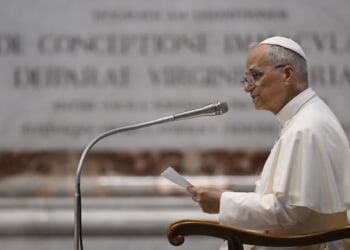Every day, the press churns out shocking scientific news that contradicts what we’ve always believed, our trusted doctors, or plain common sense. One of my hobbies is tracking down the sources. Here’s what I’ve learned: The more outrageous the research findings, the smaller and more obscure the university. The dumber the methodology, the harder it is to verify if the researchers even exist. The more groundbreaking the result, the more likely its interpretation is bogus. The more clicks a story gets, the less fact-checking the journalist did. And the more institutions and media outlets amplify and rework the story, the more dangerous the headline becomes. The “Problematic Paper Screener” database has already flagged over two million recent scientific articles as potentially fake.
A few days ago, the Spanish magazine I run, Popes80.com, published an investigation titled “Global Scientific Scandal: Millions of Fraudulent Articles Threaten Human Lives and Contaminate Research.” On one hand, you have authors signing off on research they didn’t conduct (for a fee). On the other hand, prestigious scientific journals publish articles they don’t even read (for a fee). Then there are studies that were never actually conducted and ones that lack credibility, sold at a premium to students and professionals desperate to rack up publications for career advancement. By the way: Are governments and universities creating this mess by demanding researchers churn out more and more papers to outscore their competitors? Yes. Another example of how governments ruin everything they touch, even the noble pursuit of science.
The Popes80 journalists showed how easy it is to whip up a fake scientific paper that looks legit in seconds. They created one titled “The Description of Algebraic Classes.” All they had to do was pick the authors’ names. They went with “Leo Messi, Cristiano Ronaldo, Kylian Mbappé, and Vinícius Júnior,” a nod to the FIFA Club World Cup 2025. The auto-generated article included complex formulas, graphs, and near-incomprehensible jargon. Problem is, it’s just a random mashup of phrases common in these papers — grammatically nonsensical and meaningless.
The creators meant it as a joke. But then they submitted some of these papers to scientific journals. Surprise: Several got accepted, some even praised as “truly interesting and novel research.” Options:
- The editor was plastered.
- Nobody read it.
- A flying cat landed on the editor’s keyboard and accidentally sent an acceptance email.
Coincidentally, the acceptance email often comes with a $500–$600 “processing fee,” as if they’re weaving the text in gold thread on an intern’s liver.
The real danger isn’t these prank fake papers but the unverified studies drawing false conclusions on critical topics like cancer, chemical weapons, or psychiatric disorders. When some obscure journal — whether in the U.S., India, Russia, or Iran — publishes them, they often morph into global headlines, hyping nonexistent cancer cures or, as often happens with fake research from China, promoting the grimy and dangerous Traditional Chinese Medicine pushed by the CCP. Post-COVID reminder: Never trust anything scientific coming out of China, where a regime that despises humanity tried to pin a global pandemic on a pangolin.
This flood of fake science creates false hope for patients and can even endanger lives. Even if a paper is eventually retracted after private complaints — as a small but growing number are — it circulates in the media for two or three years, cited by other researchers and used as the basis for further studies. That’s as healthy for science as trying to perform prostate surgery at home following steps from ChatGPTs.
Retractions are a pipe dream anyway. Retraction Watch logged 10,000 retracted articles worldwide in 2023, but experts estimate only 1 percent of fraudulent research ever gets pulled. Maybe we could demand universities tighten their filters to stop churning out junk science, but that would leave them less time to protest against Israel. We could ask journals to prioritize quality, but they’re too busy cashing checks from as many authors as possible. Everyone knows nobody reads those damn journals anyway, except when they publish something about natural penis enlargement remedies.
We could also ask funding institutions to be more rigorous with their grants, but that’s like asking USAID to stop wasting money on nonsense or begging the Soros clan to quit funding multiculturalism and abortions. And we could ask governments to rethink the system that rewards job candidates for piling up publications, but that’s like asking the Italian mafia to start paying taxes on hit jobs.
I’m never particularly optimistic, but on this, I’m even less so. In the age of AI-driven mass production, scientific research will suffocate under fake science. Well, screw it — they’re always trying to take away our processed snacks, tobacco, and beer anyway.
READ MORE by Itxu Diaz:
Reagan Left When No One Wanted Him To
Spy Technology No Longer Leaves Anything to the Imagination.
America’s Enemies Are Back (And There Are Fewer of Them Than Before)



![Coast Guard Rescue Swimmer Credited with Saving 165 People [WATCH]](https://www.right2024.com/wp-content/uploads/2025/07/Coast-Guard-Rescue-Swimmer-Credited-with-Saving-165-People-WATCH-350x250.jpg)







